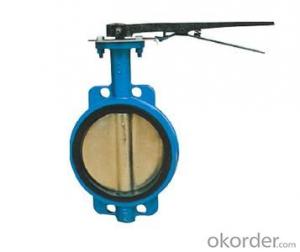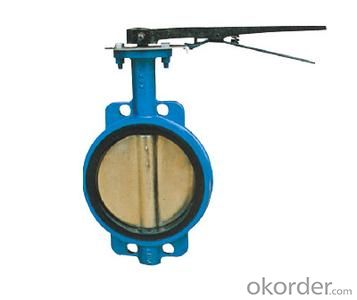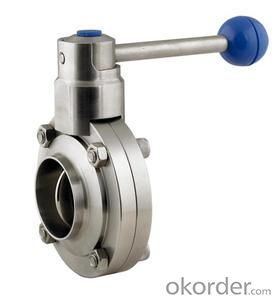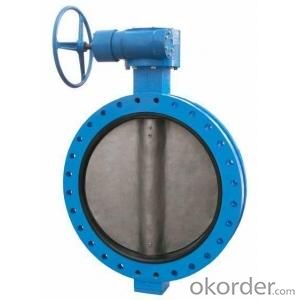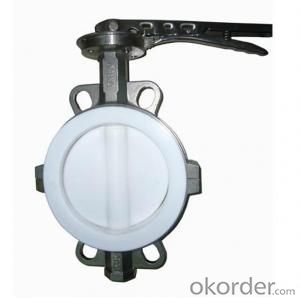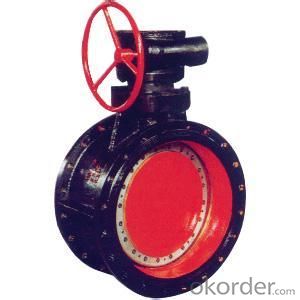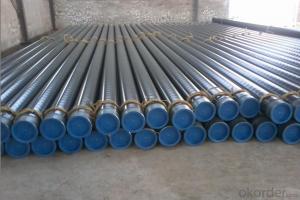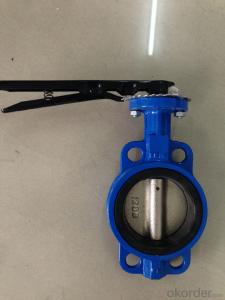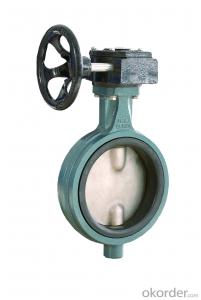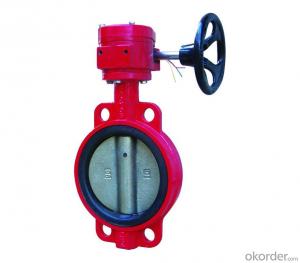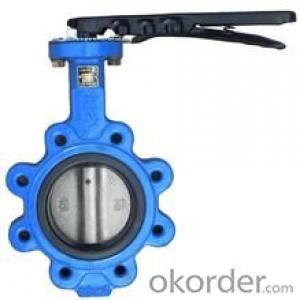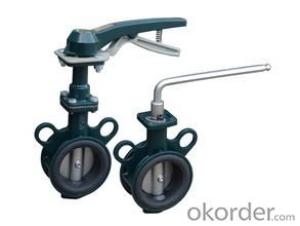ALLOY STEEL BUTTERFLY VALVE DN25-DN1200 BG290
- Loading Port:
- Shanghai
- Payment Terms:
- TT OR LC
- Min Order Qty:
- 1 pc
- Supply Capability:
- 10000 pc/month
OKorder Service Pledge
OKorder Financial Service
You Might Also Like
Specifications
Long service life, standing the test of tens thousands opening/closing operations
Butterfly Valve
Packing & Delivery:
Packing: plywood box or according to specific customer needing .
suitable for long-time sea shipment
Delivery: within 15-30days after receipt of at sight L/C or 30% as advance payment by T/T
Materials:
Body: aluminum, cast iron, ductile iron, carbon steel, stainless steel
Disc: cast iron, ductile iron, carbon steel , stainless steel
Stem: carbon steel, stainless steel
Seat: EPDM, PTFE, NBR
Specifications
Size: DN25-1200 (1”-48”)
Pressure: PN10/16( 150/200 PSI)
Actuator: handle/gear box /pneumatic /electric
Standard: API, ASTM, ANSI , DIN, BS, JIS ,ISO approved
End connection: wafer type, flange type, lug type
Features:
1.Unique stem hole design in the disc ensures a dry stem journal;
2.360 degree polished disc assures positive on-off;
3.Long service life, standing the test of tens thousands opening/closing operations;
4.Bubbles-tight sealing with no leakage under the pressure test;
5.Wide selection of materials , applicable to various medium
- Q: How do you prevent freezing in steel pipes during cold weather?
- To prevent freezing in steel pipes during cold weather, there are several measures that can be taken: 1. Insulate the pipes: Insulation is an effective way to protect steel pipes from freezing. Use insulation sleeves or wraps to cover the pipes, especially in areas where they are exposed to cold temperatures. Insulation helps retain heat and prevents the pipes from reaching freezing temperatures. 2. Seal any air leaks: Check for any gaps or openings around the pipes where cold air can enter. Use caulking or weatherstripping to seal these gaps and prevent cold air from reaching the pipes. 3. Maintain a consistent temperature: Ensure that the area where the pipes are located is adequately heated and insulated. Keeping the temperature above freezing will help prevent the pipes from freezing. If the pipes are exposed to extremely low temperatures, consider using heat tape or pipe heating cables to provide additional warmth. 4. Allow water to flow: Running a small, continuous trickle of water through the pipes can help prevent freezing. The flowing water generates heat and inhibits the formation of ice within the pipes. However, this method should only be used as a last resort, as it can waste water. 5. Drain the pipes: If the steel pipes are in an area that is not regularly used or if freezing weather is expected, it may be advisable to drain the pipes completely. Turn off the water supply and open all faucets to allow the water to drain out. This eliminates any standing water that could freeze and cause the pipes to burst. It is important to note that prevention is key, as frozen steel pipes can lead to costly damages and water leaks. By implementing these measures, you can protect your steel pipes and ensure they remain functional during cold weather.
- Q: How are steel pipes coated for protection against external elements?
- Steel pipes are coated for protection against external elements through a process called pipeline coating. This involves applying a layer of protective material, such as epoxy or polyethylene, onto the surface of the steel pipes. The coating acts as a barrier, preventing corrosion and damage from external factors like moisture, chemicals, and UV radiation. This protective coating ensures the longevity and durability of the steel pipes, even in harsh environments.
- Q: What is the impact of steel pipe size on flow rate and pressure?
- The size or diameter of a steel pipe has a significant impact on both flow rate and pressure. Firstly, the flow rate refers to the volume of fluid that can pass through the pipe per unit of time. A larger pipe diameter allows for a greater flow rate as there is more space for the fluid to move through. This is due to the fact that a larger cross-sectional area of the pipe offers less resistance to the flow of fluid. Therefore, increasing the size of the steel pipe will generally lead to an increase in flow rate. Secondly, the pressure within a pipe is influenced by its size. As the fluid flows through a pipe, it encounters resistance due to friction against the walls of the pipe. This resistance leads to a pressure drop along the length of the pipe. A smaller pipe diameter results in higher frictional losses, which leads to a greater pressure drop. On the other hand, a larger pipe diameter reduces frictional losses and therefore results in a lower pressure drop. Consequently, increasing the size of the steel pipe will generally lead to a decrease in pressure drop. It is important to note that while increasing the size of a steel pipe may generally result in a higher flow rate and lower pressure drop, there are other factors that can also affect these parameters. These include the fluid properties, the length and layout of the pipe, and any additional components such as valves or fittings. Therefore, it is crucial to consider all these factors and conduct proper calculations or simulations to accurately determine the impact of steel pipe size on flow rate and pressure in a specific system.
- Q: Are steel pipes suitable for semiconductor manufacturing plants?
- Yes, steel pipes are suitable for semiconductor manufacturing plants. Steel pipes offer several advantages such as high strength, durability, and resistance to corrosion, making them ideal for transporting various fluids and gases used in semiconductor manufacturing processes. Additionally, steel pipes can withstand high pressure and extreme temperatures, ensuring the safe and efficient operation of semiconductor manufacturing plants.
- Q: Can steel pipes be used for sewage treatment plants?
- Yes, steel pipes can be used for sewage treatment plants. Steel pipes are commonly used in sewage treatment plants due to their durability, strength, and resistance to corrosion. They are suitable for transporting sewage, wastewater, and other fluids in these facilities.
- Q: How are steel pipes installed underground?
- Steel pipes are installed underground through a process called trenching, where a trench is dug to the desired depth and length. The steel pipes are then placed in the trench and secured using various techniques such as welding or threading. The trench is then backfilled, ensuring proper compaction around the pipes to provide stability and prevent movement.
- Q: Are the welded and galvanized tubes the same weight?
- There should be no difference in the weight of the same specifications for the welded pipe and galvanized pipe. The slight difference is that the galvanized pipe should be pickled before galvanizing and must digest some iron and then galvanized. The difference depends on the difference in the process. So the theoretical calculations are the same.
- Q: How are steel pipes used in the manufacturing of chemical processing plants?
- Steel pipes are commonly used in chemical processing plants for various purposes such as transporting fluids, gases, and chemicals within the facility. They are utilized for the safe and efficient transfer of raw materials, intermediate products, and final products throughout different stages of the manufacturing process. Steel pipes provide excellent strength, durability, and resistance to corrosion, making them suitable for handling corrosive materials and operating under high pressure and temperature conditions. Additionally, steel pipes can be welded and connected easily, allowing for customized configurations and efficient installation in chemical processing plants.
- Q: What are the main types of steel pipe ah? How to judge which kind of steel pipe performance is better?
- Steel pipe according to the production method can be divided into two categories: seamless steel pipe and pipe joints, pipe joints as welded steel pipe.1. seamless steel tube according to the production methods can be divided into: hot-rolled seamless pipe, cold drawn tube, precision steel tube, heat expansion tube, cold spinning tube and extrusion tube.Seamless steel tubes are made of high quality carbon or alloy steel. They are hot-rolled and cold-rolled (drawn).Bundled steel pipe
- Q: How are steel pipes used in the renewable energy industry?
- Steel pipes are commonly used in the renewable energy industry for various applications. They are used to transport fluids, such as water or steam, in geothermal power plants. Steel pipes are also used in solar thermal power plants for transferring heat transfer fluids. Additionally, steel pipes are utilized in the construction of wind turbine towers, providing structural support for the turbines. Overall, steel pipes play a vital role in the renewable energy industry by facilitating the efficient and reliable operation of different renewable energy technologies.
Send your message to us
ALLOY STEEL BUTTERFLY VALVE DN25-DN1200 BG290
- Loading Port:
- Shanghai
- Payment Terms:
- TT OR LC
- Min Order Qty:
- 1 pc
- Supply Capability:
- 10000 pc/month
OKorder Service Pledge
OKorder Financial Service
Similar products
Hot products
Hot Searches
Related keywords
